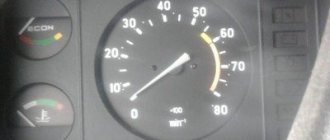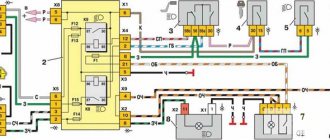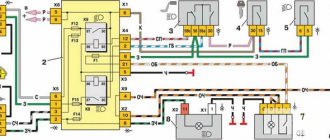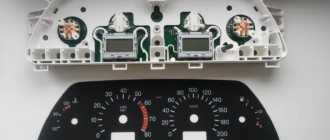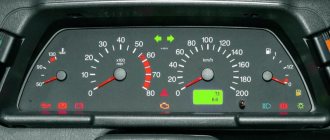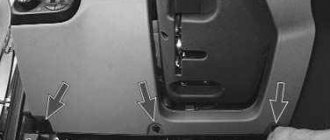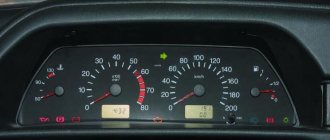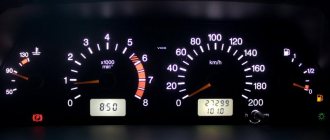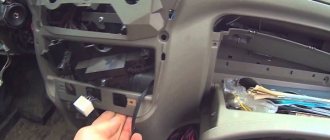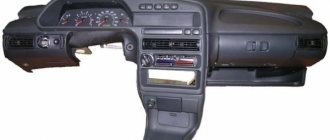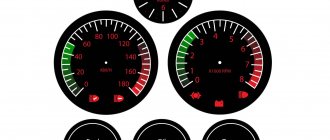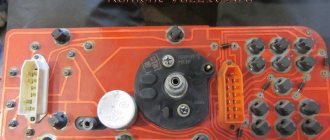Everyone values the time of day! TROUBLE! The instrument lights do not light up. First things first. Probably half a year ago my speedometer light stopped working. Today I decided to take care of it and changed two light bulbs. I put it in place, turn on the dimensions, and then “Hello.” Only the tachometer light is on and that’s it. The rest of the instruments are not illuminated, and the arrows do not light up either. The BC monitor is on and working, the arrows are also functioning, the indicator lights are all on. Only the devices do not light up. Changed the rest of the light bulbs. the same. Zero result.
Maybe someone had something similar? What could it be? Is it really necessary to change the device?
The relay and fuse box is also called the mounting block or black box. In the event of a car breakdown related to electrical equipment, the fuses and relays are first checked. If a fuse is blown, you must first determine the cause of its blown before replacing it.
Tuning and replacement of the instrument panel
If you want to tune or replace the instrument panel, then you will probably find the instructions for removing and disassembling the panel useful.
The tuning procedure involves removing and disassembling the shield, we will discuss this in detail below. Tuned tidy of a Priora car
So, to tune and replace the device, follow these steps:
- First of all, to carry out replacement or tuning, it is necessary to dismantle the tidy, having first removed the lining and disconnected all the fasteners. You also need to disconnect all wiring harnesses. If you are installing a new dashboard, then simply replace it.
- To carry out tuning, you need to remove the arrows, first disassembling the device. To prevent the panel from scratching, place thin cardboard or a plastic card under the arrows.
- The next stage of tuning will be to dismantle the panel cover; to do this, it needs to be separated from the glass base.
- So, let's proceed directly to tuning. If you want to tune the backlight, then the green coating must be removed; for this, use a stationery knife. Then you can take a plastic bag of any color, cut a small piece out of it and place it on the back of the trim. For proper tuning, cellophane must be glued.
- Simple lamps are not suitable for good illumination; it is better to use LED indicators. If you decide to install tape, then it should be glued along the entire perimeter of the scale. The pieces glued to the instrument cluster must be connected to each other with thin wires, after which the power wire is removed.
- Another step is to disassemble the display. It is necessary to remove the light filter from this element or replace it with another one. The filter can be of absolutely any color, depending on what kind of tidy light you want to get.
- The final stage will be the installation of all arrows and components on the control panel with further connection to all the necessary wires (video author - Kirill Zhukov).
What lamps are installed in the Priora dashboard
Depending on the year of manufacture, Lada Priora can be equipped with both lamps with a conventional socket and with a VDO socket. To accurately determine the lamps, you must first remove the shield and determine the type of socket. The lamps in the sockets are the same, however, from the factory, the lamp mustaches are soldered to the socket and to replace the lamp, you need to unsolder or pull out the old one and install a new lamp in its place, while soldering the mustaches.
However, you can take a simpler route by purchasing ready-made lamps with sockets. Note that the lamps are installed in them without soldering the mustaches. That is, if the lamps burn out further, you simply change the lamp and that’s it.
A regular lamp socket looks like this
This is what a lamp with a VDO socket
Panel malfunctions: signs and causes
What are the errors on the instrument panel of the Lada Priora
? What malfunctions can occur in the operation of the control panel:
- The backlight does not light up. There may be several reasons - damage to the device’s power supply circuit, a short circuit in the system, failure of the control panel. But one of the most common reasons in this case is the burnout of the safety device. The marking fuse F10 is located in the mounting block; it must be checked first.
- The sensors do not work - the arrows on the speedometer and tachometer do not rise. The reason may be a bad signal coming from the speed sensor or crankshaft sensor to the dashboard. It is necessary to check the electrical circuit for breaks. Much less often the problem lies in a failed sensor.
- The controller for the volume of gasoline in the tank and the engine temperature do not work. As in the previous case, the cause of the malfunction may lie directly in the sensors themselves. The fuel volume controller is located in the tank with the fuel pump, and the coolant sensor is located in the cylinder head. Before replacing, we recommend checking the quality of the connection and contacts - perhaps they are simply damaged or oxidized, as a result of which the sensors do not work. The reason may also be a damaged electrical circuit; in this case, you will need to check the wiring.
- It happens that the dashboard as a whole works correctly, but the controllers transmit incorrect information. The reason may lie in the performance of the processor or a short circuit in the wiring. Sometimes the problem lies in bad mass.
- The backlight is partially not working. Most likely, the reason lies in the burnout of the lighting sources; they will need to be replaced (the author of the video is the channel In Sandro’s Garage).
Auto-assistance
Pinout, tuning, lighting and removal of the VAZ-2114 instrument panel
An instrument panel and several switches for various additional devices are installed on the front panel of the Lada Priora car. If you look at the instrument panel from left to right, then it contains: tachometer, speedometer, coolant temperature indicator, fuel level indicator in the gas tank. There is a liquid crystal display under the speedometer, and below it, along the entire length of the dashboard, there are 16 warning lights. Two more turn signal indicator lamps are located at the top left and right of the speedometer. All instruments and warning lamps operate from appropriate sensors, and an electronic control unit takes part in data transmission.
Malfunctions that cause malfunctions in the operation of the instrument panel are purely electrical and are difficult to find without the appropriate knowledge. The following case can be cited as an example. The driver wiped dust from the front panel and instrument panel glass with a microfiber cloth. After these actions, when the ignition was turned on, the instrument panel refused to work at all. All instrument needles were at zero. He searched for the cause of this phenomenon and the elimination of this malfunction for quite a long time, but still found it. Apparently, a microfiber cloth, when moving over a plastic surface, creates a magnetic field, which leads to failure of the instrument panel. And fixing this malfunction is quite simple; you just need to remove the negative terminal from the battery for 10 seconds. But how much time was wasted in order for this rag, which is the cause of this malfunction, to be thrown into the trash.
A complete failure of the instrument panel can also result from the failure of the 7.5 amp fuse F10; in this case, the interior lamp and brake lights will also not light up. So it’s quite easy to check it without even opening the mounting block.
If only one device does not work, then you need to start looking for the cause of this malfunction by searching and checking the functionality of the sensor that powers this device. But again, all signals from the sensors to the dashboard instruments go through the electronic control unit. And if replacing the sensor does not give positive results, then you will have to check the electronic unit and the instrument panel itself, and here you cannot do without specialists.
The only thing the driver can do on the instrument panel is to check and, if necessary, replace a burnt-out warning light bulb. Sometimes the cause of the malfunction is simply poor contact in the connecting blocks of the wires. The driver can also check their condition himself.
The more complex the filling becomes on modern cars, the more difficult it is for the driver to find the cause and eliminate any malfunctions that arise. In these cases, knowledge and fairly easy access to information about the causes of these malfunctions are needed.
Standard instrument panel - article number and price
Why is the exclamation mark on the instrument panel of the Lada Priora and what to do?
The original car tidy exists in three types.
- the first is an option for a pre-restyling car;
- the second panel is for a restyled car;
- and the third is the “Lux” option for the restyled one, which has become faintly similar to all previous torpedoes.
Each of them contains standard elements such as a tachometer, so their functionality does not decrease. . Who wants to do tuning of the instrument panel, this option is for them.
Priora first generation
The instrument cluster for the first generation Lada Priora received catalog number 2170-3801010. Cost – about 6,000 rubles. Everything is standard with it - from left to right there are four arc scales with red arrows: odometer, speedometer, coolant temperature, fuel level. Below the speedometer there is a small on-board computer display, and above the arches are all the indicators, including the direction indicators.
Priora 2
For the Priora “Lux” variation there are two more “subtypes” - with or without a CAN bus. Different subtypes were made so that the panel could be connected to any car. Catalog number – 2170-3801010-50 without tire, 2170-3801010-60 with tire. It is distinctive in that it contains an elongated display with a screen that can highlight the navigator.
The catalog number of the combination for the “Norma” assembly is 21720-03801010-20. Cost – 6,500 rubles. Like the “Lux” version, it received a brighter speedometer and odometer, and the coolant temperature along with the fuel level indicator is hidden at the bottom of the speedometer and odometer. The base will not create a route on the display, but will show all the information in color.
Diagnostics using the built-in BC
Dashboard lighting: how to do it yourself
To view the error codes, you need to find the daily mileage reset button on the dashboard, press it and, holding it, turn the ignition key. The self-diagnosis mode will turn on. All arrows on the instruments should move from minimum to maximum values and back, and all positions on the LCD display should light up. You need to look: if any position does not light up or the arrow on any device does not move, then you should check the corresponding sensors, their networks or display for malfunctions.
Priora on-board computer
In the same mode, press any button for switching modes of the built-in BC 2 times, after which digital codes may appear on the liquid crystal display:
- 2 - very strong voltage in the BS;
- 3 - errors in the fuel level sensor system in the gas tank;
- 4 - error in the coolant temperature sensor system;
- 5 - error in the air temperature sensor system outside the car;
- 6 — motor overheating;
- 7 — emergency low oil pressure;
- 8 - malfunctions in the brake system;
- 9 - battery is low;
- E - error in the data packet stored in the EEPROM.
Many drivers ask how to reset error codes on a Lada Priora. Perhaps their built-in BC is faulty, since a working on-board computer automatically exits the diagnostic mode after 30 seconds if you do not press any control buttons.
Priora instrument panel lights do not light up
Ford Focus 2 dashboard icons
Guys, help) the whole tidy is on, only the speedometer is not on, you put the lights from the speedometer in another place, they work, and all the working lights on the speedometer do not light up, what could be the problem? Where and what to see or change? If you have the skills, then disassemble the device and look for a burnt out track or restore an erased contact pad.
If you have the skills, then disassemble the device and look for a burnt out track or restore an erased contact pad.
Now the whole panel has gone out(((we didn’t even have time to climb in(((
Apparently it was especially bright LED. )))
Not at all. She was dazzling)))
Correct the connector first.
Corrected me, I'm not a fool
How to make the instrument panel turn on the ignition
If you mean the backlight of the tidy when ignition, then you already wrote here)))
If you mean the backlight of the tidy when ignition, then you already wrote here)))
Yes, the topic is about backlighting)), but how can I search from my phone?
Yes, the topic is about backlighting)), but how can I search from my phone?
13 - contact - white - instrument lighting (remove the white wire from the block, instead apply it from the ignition switch or the D+ signal from the generator - the instrument will be illuminated when the ignition is turned on or when the engine is running. The indicator - "gauge" will work normally, as usual when incl. dimensions)
The entire instrument panel periodically began to go out (if you turn on the turn signals, the indicators turn on, but the rest of the panel is still without light), and all other indicators too. The backlight comes from the electrical package controller, contact X2-2 (white wire), then branches somewhere in the harnesses on several wires, diverging to all places, including the dashboard lighting. To begin, pull connector X2 of the electrical package controller several times (it is 20-pin), maybe the contact is bad, or you can turn on the backlight, wait until it stops working and use a needle to measure the voltage on the specified wire.
How to find X2-2: https://xn—-8sbabr6ahc3e.xn--p1ai/images/LADA_Priora/Tuning/Other/podkluchenie-antiradar-priora/mus2.jpg
If the car is new and the Central Body Electronics Unit is installed instead of the electrical package controller, then everything is simpler - the backlight takes its origins in the lighting control module, pin 58b, the wire is also white.
Hello comrades. I have the following problem: the lights on the instrument panel, heater knobs, heated glass, cigarette lighter are not on, but the lights on the power windows and MUS are on. In addition, the left side of the lights does not light up, the low beam lights up normally. What can non-burning elements have in common and where to go?
Added after 7 minutes and I was also mistaken, the MUS is not lit either
Is it possible to install LED lamps?
Instead of conventional dashboard lamps, some owners install LED ones. The advantage of them is that they provide brighter light and you can choose lamps of different colors. However, some LED lamps are longer than conventional lamps, so when installed in the instrument panel, they fit closer to the light filter and create a bright spot. But at the same time, the panel itself and the indicators become brighter.
Advantages of LEDs in the shield
- brighter light, allowing better illumination of devices
- Possibility of choosing lamps of different colors at will
- longer lifespan of quality LEDs
- Too bright LED lamps create glare on the panel, which does not look very good
- sometimes the panel looks too bright and distracts from movement
- The bright light of the panel can cause eye fatigue
When installing LED lamps in the instrument panel on a Priora. Brightness adjustment does not work very well due to the fact that diodes consume very little energy and therefore, unlike conventional lamps, do not lose brightness when the current supply is reduced.
Additional block
Additional relays are mounted on a bar and located under the dashboard, near the front passenger's feet. To get to them, you need to remove the right tunnel lining. Next to the additional relays is the electronic engine control unit (ECU).
If its connector interferes with access to the relay, disconnect it by first removing the negative terminal from the battery.
Circuit breakers
F1 (15 A) – main relay circuit, starter blocking.
F2 (7.5 A) – power circuit of the electronic control unit (ECU).
F3 (15 A) – electric fuel pump. If the fuel pump has stopped pumping (this can be determined by the absence of a sound when the ignition is turned on), check together with relay K2. There may also be problems with the immobilizer, it blocks the pump, see information about F20. If the wiring, this fuse and the relay are good, most likely the fuel pump itself has failed. To remove it, you need to disconnect the battery, remove the rear seat cushion, unscrew the cover, ring and fuel hoses, then carefully remove the entire fuel pump.
K1 – main relay.
K2 – electric fuel pump relay. See above about F3.
Relays and fuses in Lada Priora. Electrical faults VAZ-2170, -2171, -2172
F1 (25 A) - radiator cooling fan . If your fan does not work, check its motor by applying 12 V directly to it from the battery. If the engine is working properly, then most likely the problem is in the wiring or connectors. Check the serviceability of relay K1. The fan in the Priora usually turns on at a temperature of 105-110 degrees. Do not allow the engine to overheat, watch the arrow of the temperature sensor. If the fan runs constantly and does not turn off, check the coolant temperature sensor located on the thermostat. If you remove the connector from the working sensor, the fan should turn on. Check the wiring to this temperature sensor, as well as the contacts of relay K1, move this relay, clean the contacts. If this is the case, replace it with a new relay.
F2 (25 A) - heated rear window . Check together with fuse F11 and relay K2. If the rear window does not fog up, the heating element threads may have broken. Inspect all the threads and if you find a break, seal it with special glue or varnish, which can be bought at car dealerships for 200-300 rubles. Check the connection contacts at the terminals to the heating elements at the edges of the glass, as well as the switch on the dashboard and the wiring from it to the rear window.
F3 (10 A) - high beam, right headlight . F4 (10 A) - high beam, left headlight . If the headlights do not shine on high beam, check the K7 relay and the headlight bulbs. The steering column switch, wiring or connectors may also be faulty.
F5 (10 A) - sound signal . If the signal does not work when you press the steering wheel button, check relay K8. The signal itself is located under the radiator grille; you can get to it by removing the plastic casing from above. Check it by connecting the voltage to 12 V. If it doesn’t work, try turning the adjusting screw, or replace it with a new one.
F6 (7.5 A) - low beam, left headlight . F7 (7.5 A) - low beam, right headlight . When replacing lamps, be careful; there are separate lamps for the low and high beams, so they can be easily confused. It is better not to install lamps in high-power headlights; the reflectors may melt and the desired effect will not be achieved. Most low beam headlight problems that cannot be corrected by conventional means can be related to the light control module (LCM). The low beam relay is only available in cars equipped with a light sensor, it is located in the place of relay K1; on most cars this relay is not in the mounting block; the low beam circuit goes through the MUS block. It happens that the tracks in the block burn out; if there are problems, it is better to replace it with a new one. If the windshield wipers turn on spontaneously when the low beam is not working correctly, the problem is most likely in the windshield wiper control unit, located in the center of the dashboard, the topmost block, next to the radio, is best reached from the glove compartment, or by hand through the removed console covers at the feet.
F8 (10 A) - alarm signal . If the alarm does not work, also check relay K9.
F9 (25 A) - stove fan . If your stove does not work in any mode, the problem may be with the stove speed controller or with the engine. Check the stove motor by applying 12 V voltage directly to it. If it does not work, remove it, open the cover and check the condition of the brushes. If the stove does not work only in the first modes, but works in the last mode, most likely you need to replace the heater resistance, located under the hood on the fan scroll. The price of these resistors is about 200 rubles. Also check that the filter and all pipes are clean and that air flows normally into the stove. If the stove fan squeaks or turns with difficulty, try lubricating it. If the stove turns on and off, check the connectors and contacts in them, they could have melted or oxidized, in this case, replace the connector. If the car has an air conditioner, the thermal fuse may burn out; it is located near the additional resistance; the fan fuse in the configuration with the air conditioner is located under the hood in the power fuse box.
F10 (7.5 A) - instrument panel, interior lights, brake lights . If your instrument needles and gauges on the panel stop working, most likely the problem is in the connector that fits it. Check to see if it has fallen out and inspect its contacts. It may also be due to burnout of the tracks on the panel board. In this case, you need to disassemble the panel and inspect it. It can be easily disassembled by unscrewing the screws on top under the trim, on the bottom near the fuse cover and on the side.
If your brake lights do not work, none of them including the additional interior light, most likely the problem is in the switch, which is located at the base of the brake pedal, check and replace it. If some of the brake lights work and some don't, the bulbs are most likely burnt out. To replace the lamp you need to remove the headlight. To prevent the lamps from burning out, replace them with better ones.
F11 (20 A) - heated rear window, windshield wipers . If the heating does not work, see information about F2. If the front wipers do not work, check the tightness of the nuts on the shafts and the operation of the gear motor by removing it and applying 12 V voltage to it. If the motor is faulty, replace it with a new one. Removing the motor is problematic due to the design, so it is better to contact a car service. The price of a new engine is about 1,800 rubles (if the car is not under warranty). Also check the steering column switch, it may be faulty or its contacts have oxidized.
F12 (10 A) - pin 15 from devices .
F13 (15 A) - cigarette lighter . If your cigarette lighter does not work, check its contacts and wiring. Typically, problems with the cigarette lighter occur due to a short circuit after using non-standard or low-quality connectors. To replace the cigarette lighter, you need to remove the center console.
Lada Priora Hatchback Turbo › Logbook › Installing a daytime running lamp controller
Dashboard pinout Connecting VDO on a Priora car
1 Pink-white To electric power steering 2 Blue-white To hazard warning light 3 Blue-gray To emergency oil pressure sensor 4 Brown-blue To parking brake switch 5 Yellow-blue To immobilizer control unit 6 Black To airbag control unit 7 Yellow To the exterior lighting switch 8 Blue To the right turn signal switch 9 Blue with black To the left turn signal switch 10 White and blue To the computer 11. To the brake pad wear sensor 12. To the seat belt sensor 13 Black To the traction control control unit 14 Red and blue “RESET” key on the steering column switch 15 Pink-blue To the brake fluid level sensor 16 Black To ABS 17 Green To the high beam switch 18 White To the instrument cluster light control 19 Brown Panel ground 20 White-red Terminal “30” 21 Orange Terminal “ 15" 22 Yellow-red To fuel consumption sensor 23 Orange-white MK “forward” key 24 White-black MK “back” key 25 Black-white Outside temperature sensor (-) 26 Yellow-green Outside temperature sensor (+) 27 Pink Fuel level sensor 28 Gray Speed sensor 29 Green-white Coolant temperature sensor 30 Brown-red Tachometer (low voltage) 31. Service. Panel diagnostics. 32 Brown-white Terminal “L” of the generator relay regulator
Here we connect: 1) Speed control, connect the white wire to the gray wire (pin 28 of the dashboard connector) 2) Ignition, connect the yellow wire to the orange (21 pin of the dashboard connector) 3) Dimensions connect the blue wire to the yellow (pin 7 of the dashboard connector)
Next we are interested in the mounting block, on the left under the panel, namely K7 - the relay for the high-beam headlights.
A mass is attached above the mounting block with a bolt.
We unscrew the screw from the bottom and take out the mounting block from the panel; we need the relay on the bottom left.
1) Connect the red constant plus wire to the pink wire going to the high beam relay. 2) The green wire in our case to the white-green wire going directly through the fuses to the lamps
What we end up with: 1) When autostarting, the lamps do not light up. 2) The lamps light up smoothly when you start moving. 3) When parked for a long time, the headlights first dim by 50%, then turn off. 4) When the headlights are turned on, the lighting goes into normal mode and the DRL turns off.
The dashboard contains the following parts, without which the car would not function:
- external lighting controller;
- switch for turning and lighting headlights;
- signal regulator;
- instrument cluster;
- wiper regulator.
Block in the engine compartment
The power fuse box is located in the engine compartment under the hood, near the left strut support. To get to it, you need to open the lid by prying the latch.
1 (30 A) - engine control system circuit. If there are problems with the electronic control unit, short circuits or other malfunctions, this fuse may blow out.
2 (30 A) - vehicle on-board circuit. 3 (40 A) - vehicle on-board circuit.
4 (60 A) - generator circuit.
5 (50 A) - electric power steering circuit.
6 (60 A) - generator circuit.
In case of any problems, it is important not to panic, to think soberly and logically. The most important thing is to diagnose and establish the cause of the breakdown.
If you don’t have enough experience or nerves, it’s easier to sign up at the nearest car service center if it has a competent electrician.
Information icons
The machine icon may light up differently; it happens that the “car with a wrench” icon, the “car with a lock” icon, or an exclamation mark are lit. About all these notations in order:
When such an indicator lights up (a car with a key), it informs about malfunctions in the engine (often a malfunction of some sensor) or the electronic part of the transmission. To find out the exact cause, you will need to perform diagnostics.
A red car with a lock lights up, which means that there are problems in the operation of the standard anti-theft system and it will be impossible to start the car, but if this icon blinks when the car is locked, then everything is normal - the car is locked.
A yellow vehicle indicator with an exclamation mark notifies the driver of a hybrid vehicle that there is a problem with the electric drive. Resetting the error by disconnecting the battery terminal will not solve the problem - diagnostics are needed.
Everyone is used to seeing the open door icon lit when a door or trunk lid is open, but if all the doors are closed and the light on one or four doors continues to shine, then often the problem should be looked for in the door terminals (wire contacts).
The slippery road icon begins to flash when the stability control system detects a section of slippery road and is activated to prevent slipping by reducing engine power and braking the slipping wheel. There is no need to worry in such a situation. But when a key, a triangle, or a crossed out skid icon appears near such an indicator, the stabilization system is faulty.
The wrench icon pops up on the display when it’s time to perform vehicle maintenance. It is an information indicator and is reset after maintenance.
Removing the instrument panel
To remove the shield you will need a flathead and Phillips screwdriver.
Unscrew the two top screws (as shown in the picture), then carefully remove the panel under the steering column. It is held on top by clamps, and on the bottom by 3 fasteners that just need to be turned.
Under the panel we see 2 more self-tapping screws for fastening the shield; we also unscrew them. Now lower the steering wheel to the lowest position and remove the plastic cover of the shield.
Now all that remains is to unscrew the two screws holding the dashboard itself
They should be unscrewed carefully, as the screws may fall under the panel. It is better to unscrew them with a screwdriver with a magnetized tip.
We pull the panel slightly towards ourselves and see the green block and wiring harness. Disconnect it by pressing the “tab” and pulling slightly upward. After which the instrument panel will be removed.
Replacing light bulbs yourself
So, on your Priora the arrow indicators are not illuminated or the information on the LCD display is barely visible. One or more backlight bulbs have definitely burned out, and now we will try to replace them ourselves. In order to get to these bulbs, you need to remove the instrument panel.
Removing the instrument panel
To work, you will need a Phillips screwdriver about 10 cm long. A longer one will do, but it will be inconvenient to work in cramped conditions. First you need to remove the decorative trim of the dashboard. It is secured with 4 screws, the two lower ones being covered with a decorative trim under the steering column. The cover is secured with two latches at the top and three swivel fasteners. If you have ever looked into the mounting block, say, to replace fuses, then you can handle dismantling the cover in a few seconds.
After removing the decorative trim, you will get to the two lower screws that secure another plastic trim - the dashboard trim. Unscrew them.
Now find the two top screws - they are recessed into the panel. It is quite difficult to get into there with a long screwdriver (although it is possible), so I suggested stocking up on a short tool.
Unscrew these screws and the cover will come off easily.
In order to remove this trim, you do not need to dismantle the steering wheel! It is enough to install it in the lower position.
All that remains is to remove the Priora indicator panel itself. It is attached with two screws, which you can easily see when you remove the cover.
We unscrew them and carefully pull out the shield, to which there is a harness of wires connected through the green block - connector. The connector is very convenient: to disconnect it, just press the latch with a screwdriver and turn the lever
Disconnecting the PP power cable connector
Disconnect the connector and remove the instrument panel. We place it face down and see the back of the five light bulbs - these are the backlight bulbs.
Rear side of the Priora instrument panel
In order to remove the light bulb, you need to lightly press it and turn it 90 degrees counterclockwise. Take out the burnt ones and install new ones in their place.
Which lamps are suitable
Depending on the year of manufacture, the Lada Priora instrument panel is equipped with two types of backlight bulbs:
- The bulb of the light bulb is simply inserted into the socket, which is a kind of base.
- The bulb is inserted at the factory, and its leads are spot welded to this cartridge.
Non-separable (left) and collapsible light bulbs for illuminating the Priora instrument panel
The collapsible design is convenient because you don’t need to buy the entire light bulb assembly; you just need to stock up on bulbs, which are sold separately.
In the second case, you have two options:
- Buy a light bulb with an assembled socket.
- Buy a light bulb with long leads and, after biting off the burnt one, solder a new one.
Of course, the first option is simpler in terms of installing the lamp, but will cost more. The second option is suitable for those who know how to hold a soldering iron in their hands.
Penalty for faulty license plate lighting
The first regulatory act to which you should refer is paragraph 2.3.1 of the Road Traffic Regulations. According to it, traveling to a repair site with a faulty license plate backlight is possible if the driver cannot fix the fault on the spot. This is not an offense, since such a malfunction is not directly indicated as a prerequisite for prohibiting operation.
However, when driving in the dark or in conditions of insufficient visibility, regardless of the reason why the license plate illumination does not light up, the absence of illumination of the state registration plate (state registration plate) clearly turns the rear license plate into “unreadable” according to the interpretation of the law. In this case, the Code of Administrative Offenses, as amended on December 29, 2015, comes into force, stating:
". Article 12.2. Driving a vehicle in violation of the rules for installing state registration plates on it
1. Driving a vehicle with unreadable, non-standard or installed state registration plates in violation of the requirements of the state standard, except for the cases provided for in Part 2 of this article, shall entail a warning or the imposition of an administrative fine in the amount of five hundred rubles. »
Thus, driving with the rear license plate illumination completely inoperative during daylight hours for a traffic police officer can only be grounds for warning the driver about this malfunction, while in the dark this is already a reason for drawing up a protocol on an administrative offense.
Important! We can talk about the license plate being unreadable only if all the license plate illumination lamps are not lit. If one of them is on, the traffic police officer has no right to bring the driver to administrative responsibility
The interpretation of the law also includes severe contamination of license plate lamps.
Location of Priora fuses under the hood
- F1 (30 A) – power supply fuse for the electronic engine control system (ECM);
- F2 (60 A) – fuse for the power supply circuit of the engine cooling system fan (power circuit), additional relay (ignition relay), rear window heating, electrical package controller;
- F3 (60 A) – fuse for the power supply circuit of the electric fan of the engine cooling system (relay control circuit), sound signal, alarm signal, ignition switch, instrument cluster, interior lighting, brake light, cigarette lighter;
- F4, F6 (60 A) – generator power circuit fuses;
- F5 (50 A) – fuse for the power supply circuit of the electromechanical power steering
Relay and fuse box for Halla air conditioner
- right electric fan power supply fuse (30 A);
- fuse for the power supply circuit of the left electric fan (30 A).
- right electric fan relay;
- additional relay (sequential activation of left and right electric fans);
- left electric fan relay;
- heater fan power supply fuse (40 A);
- compressor power supply fuse (15 A);
- heater fan relay;
- compressor relay.
Panasonic air conditioner relay and fuse box
- Heater fan maximum speed
- Right fan
- Fan sequential relay (low speed)
- Left fan
- Left fan fuse (low speed)
- Right fan
- Heater fan
- Compressor
- Heater fan
- Compressor
How to remove the instrument panel, tuning, modifications
Removing the instrument panel on VAZ 2110, 2111 and 2112 cars is not an easy task. But at the same time, it is possible to carry out this repair yourself, if you have the necessary tools at hand, as well as clear instructions.
Regarding the action plan, there are not many detailed guides on the Internet for removing and installing the instrument panel, and all this is due to the fact that the procedure has a number of difficulties and subtleties that not everyone can remember when writing such an article.
However, I will try to make material that will at least 90% help give the overall picture and the main points that should be taken into account when removing the panel on a VAZ 2110-2112. To perform the repair you will need the following tool:
- Phillips screwdriver, both short and long
- 10 mm head, preferably deep
- Ratchet handle or crank
- Wire cutters or sharp knife
- Flashlight if necessary
Removing and installing the instrument panel on VAZ 2110, 2111 and 2112
Before you begin this repair, you must do the following:
After this, you can proceed to further actions. We immediately remove and remove all the elements of the panel, such as: the standard clock, the heater control unit, the display unit, as well as the central deflector, and do not forget about the buttons with the radio. As a result, we get approximately the following picture:
Next, using a screwdriver, pry up and remove the plugs at the upper corners of the instrument panel mounting. In reality it looks like this.
On the other side, we do the same, after which, using a socket and an extension, we unscrew the nuts securing the instrument panel in the upper part.
Now let's move on to the remaining attachment points. At the bottom, in the left and right parts of the panel - in the corners, there is also one screw that needs to be unscrewed. The first one is shown below.
The second one is located on the right side of the panel in the same place - at the bottom in the corner. Also, immediately unscrew the self-tapping screw that secures the diagnostic block:
Now we move on to the side fastening points of the frame, which are located in the center on each side - the photo below shows the left side:
On the right everything will be the same. Next we move on to the internal frame fastenings, which are located in the following places. The first one is under the fuse mounting block, to get there we open the cover and look inside the panel:
The second one on the right is visible when the glove compartment lid is open:
Of course, the mounting block will also have to be removed so that it remains intact with the sub-panel wiring.
- We thread it inside with the instrument panel pulled back; you will also have to cut off some of the wiring fastening clamps, for example, in this place, which is shown in the photo:
- Now we are trying to remove the VAZ 2110 panel, moving it to the side on both sides, evenly, without much effort or sudden movements.
In the photo above you can see that the headlight hydraulic corrector tubes were cut off, since in my case they were simply not needed. If you need to save them, do everything carefully and remove them by pulling the control unit out of the instrument panel. Next, we finally remove the panel, of course, after first disconnecting all the wires that will interfere with this.
Installation occurs in the reverse order, connecting all wires and connectors to their places, blocks and switches, as well as other elements that were removed as a result of this procedure.
Installation of Europanel instead of the usual one on VAZ 2110, 2111 and 2112
Many owners who have owned a VAZ 2110 for a long time would like to change the boring panel to a more modern one. In this case, you can install a new type of panel from cars manufactured after 2006, or from the “Bogdan” versions, which are analogues of the tenth family, except that they were assembled in Ukraine.
With such alterations, basically you won’t have to change anything, but it’s worth considering that in this case you need to buy a complete Europanel:
- instrument panel frame assembly with trim
- instrument panel (combination)
- buttons and switches
- heater deflectors
- New heater control unit
- sub-panel wiring
- steering wheel, cover and switches
Only in this case everything becomes without any problems with minimal labor costs.
Possible reasons
What to do in a situation where the instrument panel backlight on a VAZ-2110 car has disappeared? First of all, you should look for the reason why this malfunction occurred. Sometimes it can be identified immediately, but in some cases this process takes some time. In fact, there may be several reasons, so you will need to check everything methodically.
The most banal and simplest option is that someone turned the rheostat knob, which is responsible for the amount of light flux, all the way to the left.
This, by the way, is often the sin of children who are placed in the front seat. “Young drivers” love to turn all sorts of knobs, press buttons and switch levers. Perhaps the adults overlooked it, and the child “corrected” the dashboard lighting. The problem, as you understand, is solved by simply returning the rheostat knob to its previous position. Therefore, before you start looking for possible reasons for the sudden disappearance of the backlight, check this particular point.
I would like to remind you of one simple rule. In a situation where there may be several possible causes of failure, when searching you need to follow the path of least resistance. In other words, test the simplest assumptions first. You may be lucky and find the problem with minimal time and effort.
If the reason is not in the position of the rheostat handle, you need to proceed to further search for the causes of the breakdown. Possible sources of problems here could be:
- fuse;
- instrument panel circuit board;
- contacts;
- wiring;
- failure of light bulbs due to short circuit.
So, let's look at some of the above reasons in more detail. After the rheostat handle, you should check the integrity of the 5-amp fuse F1. You can also usually turn on the side lights and see if they work on the left side. Everything is explained here simply. The lamps that illuminate the instrument panel, the left side lights, as well as the trunk lighting operate through this fuse. The dimensions located on the right side of the car receive power through F11, that is, they are not of interest to us in this particular case.
You may see the following situation. The left side parking lights, or trunk light, work, but the instrument panel light does not. This means that the problem is not in fuse F1. Therefore, you need to continue searching for the possible cause of the malfunction. In particular, it is necessary to check the contacts of the rheostat that illuminates the dashboard lighting. It is not uncommon for plugs to fall off. Accordingly, the lighting of the shield disappears due to lack of contact.
However, the rheostat itself can also fail. It is quite easy to check this assumption. To do this, you must first remove the rheostat, and then directly connect its contacts. If after this manipulation the instrument panel lights come to life, it means that the problem has been found, and you just need to replace the failed part. If not, then you need to continue searching further.
Block in the engine compartment
The power fuse box is located in the engine compartment under the hood, near the left strut support. To get to it, you need to open the lid by prying the latch.
1 (30 A) - engine control system circuit. If there are problems with the electronic control unit, short circuits or other malfunctions, this fuse may blow out.
2 (30 A) - vehicle on-board circuit. 3 (40 A) - vehicle on-board circuit.
4 (60 A) - generator circuit.
5 (50 A) - electric power steering circuit.
6 (60 A) - generator circuit.
In case of any problems, it is important not to panic, to think soberly and logically. The most important thing is to diagnose and establish the cause of the breakdown.
If you don’t have enough experience or nerves, it’s easier to sign up at the nearest car service center if it has a competent electrician.
I hope this article will help you deal with electrical problems and quickly fix any Priora malfunctions. If you have any experience or information, please leave a comment below, useful information will be added to the article.
Hello guys. Tell me, the backlight of the heater control unit is not on. where to go, where to start? maybe there is a fuse?
The tidy flashes along with the turn signals — Lada 2110, 1.5 l., 2003 on DRIVE2
Comments 17
Participate in the discussion can only registered users.
The same crap... Is the problem solved?
The problem was mass. stretched the entire mass along the body
But pulling the mass didn’t help me, I even duplicated it and still didn’t care. Maybe there is something hidden?
Look at the mass from the battery on the body of the car. I had this happen, I replaced the wire with a new one. The terminals are tinned, at the same time I installed new terminals on the battery. And use a knife to clean the place on the body where the terminal is adjacent. It may also be necessary to tighten + on the generator.
Is the problem resolved or not? I have the same nonsense in Prior.
hi! did you figure out your problem? I have a similar problem((
Hello! Not yet. No time. I’ll post as soon as I figure it out!
check the tightness of the power wire terminals on the generator; it blinks, which means the voltage drops at the moment of load, and the voltage regulator in the generator (chocolate) does not have time to compensate.
Also check if the headlights flicker at XX. which goes away as the rpm increases
I’ll check the wires on the generator tomorrow. Well, as I understand that the emergency lights and turn signals are together, why is there no such thing with emergency lights?
check voltage under load and flickering of headlights at idle
check the tightness of the power wire terminals on the generator; it blinks, which means the voltage drops at the moment of load, and the voltage regulator in the generator (chocolate) does not have time to compensate.
Also check if the headlights flicker at XX. which goes away as the rpm increases
An exclamation mark is lit on the dashboard: what should the driver do?
Taking into account the fact that there may be several reasons, with the brakes being the most serious, let us dwell on this problem in more detail. If the exclamation mark is on on the panel, the first step is to check the brake fluid level in the reservoir. To do this, just put the car on a level surface, unscrew the tank cap and make sure that the level is between o and “max”. If the level is below the minimum mark, then the exclamation mark on the panel lights up based on a signal from the sensor.
In the case where the driver recently checked the level, and now there has been a sharp decrease, it is important to find the cause of the leakage of fuel fluid from the system. This could be brake hoses, hydraulic clutch, brake cylinders, etc.
It also happens that the indicator lights up while driving over bumps, and then goes out on a smooth road. This means that there is little liquid in the tank, but the level has not yet dropped to a critical level. When the car rocks, the sensor is triggered, while on a flat surface the level of brake fluid is still sufficient for the indicator to go out.
It should be remembered that during operation it is important to periodically monitor the fluid level, use only recommended fluids for topping up, and also promptly change the fluid and bleed the brakes. Let's move on
It may happen that after setting the level, the problem does not disappear. In such a situation, you need to check the fuel oil level sensor itself. The sensor is located in the master cylinder reservoir. To check the sensor, you need to do the following:
Let's move on. It may happen that after setting the level, the problem does not disappear. In such a situation, you need to check the fuel oil level sensor itself. The sensor is located in the master cylinder reservoir. To check the sensor, you need to do the following:
- We turn on the ignition, the exclamation mark lights up, which indicates a low fuel fluid level. Normally, the icon should go out if the level is normal and the sensor is operating normally. If this does not happen, and the liquid level in the tank is normal, then you need to “throw off” the power from the sensor. If the light goes out, the problem is often in the sensor. The float often breaks and lies at the bottom, although there is enough liquid in the tank.
- In the case where the exclamation mark is lit and no power is supplied to the sensor, this situation may indicate problems with the wiring, and the sensor is most likely in working order. The wiring may short out, damage, breaks, etc. may occur.
Possible reasons
What to do in a situation where the instrument panel backlight on a VAZ-2110 car has disappeared? First of all, you should look for the reason why this malfunction occurred. Sometimes it can be identified immediately, but in some cases this process takes some time. In fact, there may be several reasons, so you will need to check everything methodically.
The most banal and simplest option is that someone turned the rheostat knob, which is responsible for the amount of light flux, all the way to the left.
This, by the way, is often the sin of children who are placed in the front seat. “Young drivers” love to turn all sorts of knobs, press buttons and switch levers. Perhaps the adults overlooked it, and the child “corrected” the dashboard lighting. The problem, as you understand, is solved by simply returning the rheostat knob to its previous position. Therefore, before you start looking for possible reasons for the sudden disappearance of the backlight, check this particular point.
I would like to remind you of one simple rule. In a situation where there may be several possible causes of failure, when searching you need to follow the path of least resistance. In other words, test the simplest assumptions first. You may be lucky and find the problem with minimal time and effort.
If the reason is not in the position of the rheostat handle, you need to proceed to further search for the causes of the breakdown. Possible sources of problems here could be:
- fuse;
- instrument panel circuit board;
- contacts;
- wiring;
- failure of light bulbs due to short circuit.
So, let's look at some of the above reasons in more detail. After the rheostat handle, you should check the integrity of the 5-amp fuse F1. You can also usually turn on the side lights and see if they work on the left side. Everything is explained here simply. The lamps that illuminate the instrument panel, the left side lights, as well as the trunk lighting operate through this fuse. The dimensions located on the right side of the car receive power through F11, that is, they are not of interest to us in this particular case.
You may see the following situation. The left side parking lights, or trunk light, work, but the instrument panel light does not. This means that the problem is not in fuse F1. Therefore, you need to continue searching for the possible cause of the malfunction. In particular, it is necessary to check the contacts of the rheostat that illuminates the dashboard lighting. It is not uncommon for plugs to fall off. Accordingly, the lighting of the shield disappears due to lack of contact.
However, the rheostat itself can also fail. It is quite easy to check this assumption. To do this, you must first remove the rheostat, and then directly connect its contacts. If after this manipulation the instrument panel lights come to life, it means that the problem has been found, and you just need to replace the failed part. If not, then you need to continue searching further.
The most serious problem due to which the instrument panel lighting disappears is damage to the printed circuit board of the dashboard itself. In particular, there are often situations when the track on it that supplies power to the lamps burns out. One point worth noting here. The instrument panel in such a situation cannot be repaired, which means there is only one way out - replacement with a new one.
There are cases when, due to a short circuit, all the lamps illuminating the instrument panel burn out. However, this happens quite rarely. Much more often, one lamp may fail. As you can see, there are several reasons why the instrument panel lighting may disappear. Accordingly, the search will take some time. However, in the vast majority of cases, eliminating the malfunction that has arisen will not be so difficult, and many people can easily do this with their own hands.
Block in the engine compartment
The power fuse box is located in the engine compartment under the hood, near the left strut support. To get to it, you need to open the lid by prying the latch.
1 (30 A) - engine control system circuit. If there are problems with the electronic control unit, short circuits or other malfunctions, this fuse may blow out.
2 (30 A) - vehicle on-board circuit. 3 (40 A) - vehicle on-board circuit.
4 (60 A) - generator circuit.
5 (50 A) - electric power steering circuit.
6 (60 A) - generator circuit.
In case of any problems, it is important not to panic, to think soberly and logically. The most important thing is to diagnose and establish the cause of the breakdown.
If you don’t have enough experience or nerves, it’s easier to sign up at the nearest car service center if it has a competent electrician.
I hope this article will help you deal with electrical problems and quickly fix any Priora malfunctions. If you have any experience or information, please leave a comment below, useful information will be added to the article.
Everyone values the time of day! TROUBLE! The instrument lights do not light up. First things first. My speedometer lights probably stopped working half a year ago. Today I decided to do it, changed two light bulbs. I put it in place, turn on the dimensions, and then “Hello.” Only the tachometer backlight is on and that’s it. The rest of the instruments are not illuminated, the arrows also do not light up. The BC monitor is on and working, the arrows are also functioning, the indicator lamps are all on. Only the devices do not light up. I changed the other light bulbs. the same. Zero result.
Maybe someone had something similar? What could it be? Is it really necessary to change the device?
see also
Comments 44
How was the problem solved? I have the same problem, tried several devices, same thing
Did you figure out what the reason was? Otherwise the same problem happened
The tidy was dead, but everything that was measured was with canshina, that’s why they didn’t work
Help me figure it out too, I start the car, move away, the arrows are on (revolutions, speedometer) after a few km they start working
During the test, these hands shake while standing still...
where to drip? what to do?
To change the color in the tidy, you just need to change the light bulbs and that’s it?
By the way, I also tinkered with it, changed the fuse, untwisted it and just made the contact tighter, then it started working on its own
I had the same thing, the car was parked clean for 2 weeks, I drove it around and it came back (tidy) to work on its own
Well, let's hope, although I have already planned to buy a new one!
Thank you all for your help, after all, the panel is dead, I’ll have to buy a new one (((
under the hood there is a fuse on board the network, etc. in the Murzilka, read it, I had a recharge on the 2110 and the shield froze...
Does anyone know if it is possible to replace the pointer motors? My tachometer is broken!
Anything is possible! It’s soldered in from another panel! I’ve never seen it separately!
How to change instrument lighting on a Priora
Replacing the backlight of the Lada Priora instrument panel
Task: replace the dashboard backlight in Lada Priora
We remove the dashboard of the Lada Priora. Let's disassemble it, everything is simple (4 screws and everything else is secured with latches). Another important thing is to carefully remove the hands and not damage them. Peel off the lining (overlay with numbers) and on the back side of this lining we begin to erase the green coating. I washed with ear sticks and rubbing alcohol (solvent is not recommended).
Next, carefully remove the LCD screen. We take out the green filter, erase the green coating of the filter and put everything back
Next, we change 5 light bulbs to white LEDs (you can also install red or blue LEDs, whichever backlight you prefer). I bought white LEDs together with a base at a radio store.
Let's put everything back together in reverse order.
The photo shows that it shines brightly, but in real life it is much worse. After driving around, some diodes began to blink, apparently there was a bad contact, and I decided to change the backlight a little.
I bought 1 meter of LED strip and a soldering iron with a thin tip.
hide
1 Replacing Priora lamps in 5 minutes
2 Illumination of the instrument cluster Lada Priora 2.1 Soundproofing Priora
Replacing backlight
dashboard _
Lada
Priora
VAZ 2170.
Illumination of the instrument cluster Lada Priora
Backlight tuning
instrument clusters
Priora
frets from Pavel Medved.
Let's begin. We take the tape and cut strips, 3 diodes in each, and solder the wiring to them. I took solid copper wire.
Next, glue these strips in the same way as shown in the photo. In some places it is necessary to drill holes for the wires.
Let's check this whole thing. To test the LEDs, I bought a 9 volt Krona battery. All diodes light up
We take the board and connect it to the car, turn on the dimensions and use the control light to find the plus and minus of the backlight. And solder the wiring to them.
Then we assemble everything and twist and insulate all the wires.
I wanted blue arrows. I bought blue fluorescent paint at an art salon. I wiped off the red coating on the hands and painted it.
It shines very brightly. You set the backlight control to minimum and everything is fine, it doesn’t dazzle. But still I decided to tint it with 20Koy.
Here is the final version of the work done. I spent 2 evenings on this matter and was pleased with the result. Now it shines evenly and brightly.
Result: work on replacing the dashboard backlight of the Lada Priora has been completed
